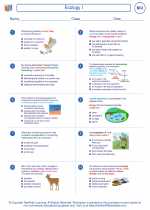Altitude
Altitude refers to the height above sea level at any point on the Earth's surface. It is an important factor that affects climate, weather, and living organisms. As altitude increases, the atmospheric pressure decreases, which in turn affects temperature, precipitation, and oxygen levels.
Factors Affecting Altitude
Several factors contribute to the variation in altitude, including tectonic activity, volcanic eruptions, erosion, and weathering. The highest point on Earth is the summit of Mount Everest, which has an altitude of 8,848 meters (29,029 feet) above sea level.
Effects of Altitude on Living Organisms
Altitude affects living organisms in various ways. As altitude increases, the availability of oxygen decreases, which can lead to physiological adaptations in animals and plants. In humans, exposure to high altitudes can result in altitude sickness, characterized by symptoms such as headache, nausea, and dizziness.
Study Guide
- Define altitude and explain its significance.
- Discuss the factors that contribute to variations in altitude.
- Explain the effects of altitude on climate and weather patterns.
- Describe the impact of altitude on living organisms, including physiological adaptations and altitude sickness.
- Compare and contrast the characteristics of high-altitude and low-altitude ecosystems.
- Discuss the importance of studying altitude in the fields of ecology, biology, and environmental science.
Understanding altitude is crucial for comprehending the interactions between the Earth's surface and the atmosphere, as well as the adaptation of living organisms to different environmental conditions.
.◂Biology Worksheets and Study Guides High School. Ecology I

 Worksheet/Answer key
Worksheet/Answer key
 Worksheet/Answer key
Worksheet/Answer key
 Worksheet/Answer key
Worksheet/Answer key
 Vocabulary/Answer key
Vocabulary/Answer key
 Vocabulary/Answer key
Vocabulary/Answer key
